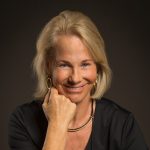I first met Melanie Brooks, author of Writing Hard Stories: Celebrated Memoirists Who Shaped Art from Trauma, at The Iota Short Prose Conference in the summer of 2016. I had recently graduated an MFA program and lost my dad and I was trying to write about my grief.
Melanie talked with me late one night after an open reading session. I hadn’t wanted to share my work, but she encouraged me. We both ended up in tears.
Melanie had lost her father too, at age twenty-three, under extraordinary circumstances. A distinguished surgeon, he was accidentally infected by a contaminated blood transfusion while undergoing open heart surgery. He contracted AIDS at the height of the epidemic in 1985. The stigma associated with the disease caused him to hide his illness from everyone but his family. He lived another ten years. The effects on his daughter were profound. It was this ‘hard story,’ or what she calls in her book, “the dangerous territory” of her truth, she was having difficulty writing about.
During her MFA, Melanie wrote a thesis paper—which ultimately became Writing Hard Stories—in which she interviewed eighteen authors, including Richard Blanco, Andre Dubus III, Mark Doty, Sue William Silverman, Richard Hoffman, and Abigail Thomas, on their process writing memoir about their own tragic stories. Only after she had spoken to all eighteen could she find her way to completing the memoir she envisioned writing in graduate school, now out on proposal with a working title of A Complicated Grief: A Daughter’s Story.
I met Melanie again at HippoCamp: A Conference for Nonfiction Writers, where she was a presenter. We grabbed breakfast one morning so I could ask her a few questions about her process. — Ryder Ziebarth
RZ: What a treat it is to see you again, Melanie, and to know you have your memoir out on proposal. I also have to tell you how helpful Writing Hard Stories was to me personally. The book is a brilliant concept in helping writers shape important events in their lives that must be shared. Tell me what it feels like to have finally come out on the other side of writing your own ‘hard story’?
MB: So great to see you, too, Ryder! Being at this stage in the process, near completion, feels like a gift—one I honestly thought I’d never receive. The burden of my family story, my story, always felt so overwhelming, and I believed it would feel that way forever. Writing through it, finding the right language and shape, and, in the process, coming to a deeper place of understanding, has lightened that weight. I feel like I am carrying it differently now.
RZ: What was the one author interview that helped you move on and into your own writing the most? Was there one “ah-ha” moment, a cumulation of moments, or one specific walk with an author when you realized you could get un-stuck enough to write through your own pain and into your own memoir?
MB: I’m not trying to be diplomatic when I say that it would be impossible for me to choose just one moment from the two years of interviewing these writers that changed everything. That’s really not the way it worked. The shift that enabled me to dive deeper into the tough places in my memories and linger there long enough to find the meaning in the experiences was gradual. Every time I sat down with one of these writers and listened to them talk candidly about their own journeys to bring their stories to the page, I found similarities in their processes and mine, and listened to their encouragement that always included the promise that I would get to a place where I felt differently about my story, where I could breathe a little bit easier. Their words oxygenated my process and gave me the courage I needed to keep going. Honestly, I could point to an “ah-ha” moment in each one of these meetings.
RZ: Each interview in Writing Hard Stories is a linear narrative, not a profile, and not a Q&A. Tell me how you chose the structure? Who did you interview first, and who did you interview last and why?
MB: I began this quest as a third-semester project for my MFA, not as a book project. So I thought I might have the opportunity to interview a few of these authors and then I’d write an article about the psychological challenges memoirists face in the process of revisiting difficult memories. What happened, though, was that they all responded to my queries, and they all generously offered to meet with me personally. I visited their homes, went out to eat at wonderful restaurants, shared intimate space with each of them in which they talked to me as much about my work as they talked about their own. Reducing these rich meetings to “sound bites” in an article just didn’t feel right. I wanted to capture the whole experience in a narrative way. A big part of that narrative was the transformation that happened for me. By the time I completed my last interview with Richard Blanco in February 2016, I was not the same writer I had been when I began this quest and interviewed Sue William Silverman in March 2014. Along the way, I’d shed a lot of the fear and insecurity that kept me from facing the truths in my story. I finished my MFA and my creative thesis, two-thirds of my memoir, while I wrote Writing Hard Stories. In the same way I felt heartened each time I learned that these writers faced parallel challenges to mine, I recognized that my readers—many of whom are emerging writers who find themselves where I was when I started—could be encouraged by that part of the story, too.
RZ: This is a hard question to ask, because your father was so vigilant with his privacy, but what do you think he would say now that you are finally able to tell your own story?
MB: My father and mother wrote and published their own book, Borrowed Time: A Surgeon’s Struggle with Transfusion-induced AIDS, in Canada in 1995—the same year my father died. Dad made the courageous decision to stop hiding his illness and to publicly share his story because he wanted to live his life authentically, even with so little time left. He hoped that telling his truth might help others facing similar struggles. I have the same intentions now. I aspire to live my life authentically, and seeking to understand how this experience has shaped and continues to shape the person I am is a big part of that journey. I also hope that sharing my piece of this story will give others who have lived the lonely silence of secrets and faced the pain of grief and loss permission to find their voices, too. I know my father loved me and wanted only what was best for me. I know my father had deep compassion for the suffering of others and made it his life’s calling to help alleviate that suffering when he could. I hope he’d be proud.

Melanie Brooks is a freelance writer, college professor, and mother living in Nashua, New Hampshire with her husband, two children and yellow Lab. She’s the author of WRITING HARD STORIES: CELEBRATED MEMOIRISTS WHO SHAPED ART FROM TRAUMA (Beacon Press, 2017). Melanie received her master of fine arts in creative nonfiction from the University of Southern Maine’s Stonecoast MFA program. She teaches at Northeastern University in Boston, Massachusetts, Merrimack College in North Andover, Massachusetts, and Nashua Community College in New Hampshire. Her work has appeared in the Washington Post, Creative Nonfiction, Literary Hub, Brevity’s Nonfiction Blog, Bustle, The Manifest-Station, Hippocampus, The Huffington Post, Modern Loss, Solstice Literary Magazine, The Recollectors, The Stonecoast Review and Word Riot. Her almost-completed memoir explores the lasting impact of living with the ten-year secret of her father’s HIV disease before his death in 1995. Her writing is the vehicle through which she’s learning to understand that impact.
 Ryder Ziebarth received an MFA in Creative Nonfiction from Vermont College of Fine Arts in 2016. She is the founder of the Cedar Ridge Writers Series of writing workshops. Her work has appeared in N Magazine, The New York Times, Brevity, Tiferet, and Assay, among other publications. Ryder works for the Nantucket Book Festival, in Nantucket, Ma., and was a former associate editor for Tiferet. She lives on Cedar Ridge Farm in rural New Jersey.
Ryder Ziebarth received an MFA in Creative Nonfiction from Vermont College of Fine Arts in 2016. She is the founder of the Cedar Ridge Writers Series of writing workshops. Her work has appeared in N Magazine, The New York Times, Brevity, Tiferet, and Assay, among other publications. Ryder works for the Nantucket Book Festival, in Nantucket, Ma., and was a former associate editor for Tiferet. She lives on Cedar Ridge Farm in rural New Jersey.
I read Melanie’s wonderful and informative book as I was struggling to tell my own hard story which resulted in published essays and blog posts. One takeaway from her book was that one doesn’t have to tell the whole story at once. I had been trying to gather all the broken pieces into one picture frame. It doesn’t work. I look forward to reading more of Melanie’s work.